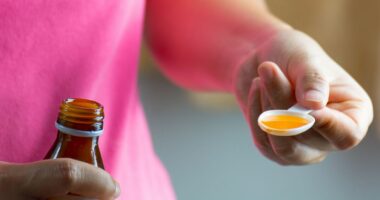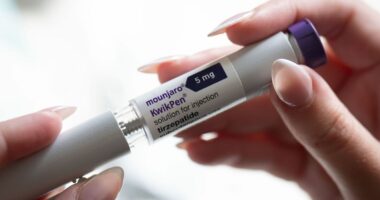Share this @internewscast.com
Cans of carbonated beverages have often been held responsible for contributing to weight gain and dental issues—and now, researchers are investigating their potential impact on mental health.
A team of German researchers explored the connection between fizzy drink consumption and major depressive disorder (MDD).
MDD—or depression—is described by the NHS as ‘a low mood that can last a long time or keep returning’.
The mental health organization MIND estimates that four out of every ten individuals in the UK have been diagnosed with depression, while approximately 21 million Americans are affected by the condition.
The German study, titled Soft Drink Consumption and Depression Mediated by Gut Microbiome Alterations, was published in medical journal JAMA.
The scientists sought evidence suggesting a connection between changes in the gut microbiome—a term that encompasses the vast collection of microorganisms, including bacteria, fungi, viruses, and other microbes residing in the digestive system—and mental health issues.
They are mostly found in the large intestine where they help aid digestion and the absorption of vitamins and minerals.
The gut microbiome is also involved in regulating the body’s immune system.

A team of German researchers explored the connection between fizzy drink consumption and major depressive disorder
The study focused on exploring whether major depressive disorder (MDD) could be initiated or exacerbated by two specific microorganisms: eggerthella and hungatella.
Eggerthella has associations with inflammatory bowel disease and arthritis, and high concentrations of hungatella have been identified as a potential factor in bowel cancer.
The bacteria have been linked to MDD, after previous studies found high levels of both were found in subjects with depression.
In order to establish a formal link, researchers analyzed stool samples from 405 patients aged 18 to 65 with a depression diagnosis, to measure the levels of these bacteria.
The group was 68 per cent female, and the researchers tested people who were both medicated and unmedicated to ‘ensure that soft drink consumption was not primarily influenced by antidepressants’.
These were then compared with a control group of 527 people who do not have MDD.
All the subjects were asked to keep a diary of how many fizzy drinks they had a day, as well as note their depression levels using the BDI-I, an industry-recognised measurement scale.
The consumption of carbonated soft drinks was assessed using a validated German 101-item semiquantitative food frequency questionnaire (FFQ2), developed as part of the European Prospective Investigation into Cancer and Nutrition.

Drinking fizzy drinks was linked to increase levels of a particular gut bacteria
Participants were asked to report their usual intake frequency of a single portion, as depicted visually in the questionnaire, over the preceding year.
The response categories ranged from ‘never’ to ‘several times per day’.
In regards to lemonade and Coke, the frequency of consuming a 200ml—roughly the size of a mini can—was assessed using a scale ranging from ‘never’ to ’11 times per day.’
The researchers found that higher soft drink consumption was associated with higher symptom severity in female participants—and higher levels of eggerthella abundance. They did not see the same pattern in the male participants.
They concluded that ‘soft drink consumption may contribute to MDD through gut microbiota alterations, notably involving eggerthella’.
Lead author Sharmili Edwin Thanarajah wrote that sex has an impact on the body’s gut microbiome, and this is likely why women are more affected by drinking soft drinks—even though their data revealed that men drink more of them.
Furthermore, they described soft drinks as a ‘widely distributed but fully avoidable risk factor’, adding that doctors should advise patients to reduce their soft drink intake as part of eating a healthy and balanced diet.
However, some experts are approaching the results with caution, least of all as the study cannot confirm if drinking soft drinks causes depression, or are just favoured by the people with the condition who were studied.
Dr Rachael Rigby, Senior lecturer in Biomedical and Life Sciences, Lancaster University, said that the study wasn’t without limitations.
She said: ‘One must consider whether we’re looking at cause or effect, i.e. did the bacterial changes (due to increased [soft drink] consumption) or the depression come first?
‘Did participants, presenting with MDD, drink more soft drinks to cheer themselves up/provide energy and thus retrospectively induce the bacteria changes?
‘Of note, the MDD participants had lower levels of education, representing a confounding variable which may contribute to MDD and ostensibly promote SSB consumption.’
Dr Rigby also pointed out that as most subjects in the study were female, more research was needed into if ‘the influence of sex hormones exacerbating the impact of [soft drinks].’
Earlier this month, Brazilian researchers found that guzzling just one diet fizzy drink everyday could rapidly raise the risk of brain decline.
Commonly-used sweeteners including aspartame, found in drinks like Diet Coke, Sprite and products like Extra chewing gum as sugar alternatives, have long been linked to certain cancers and heart issues.















